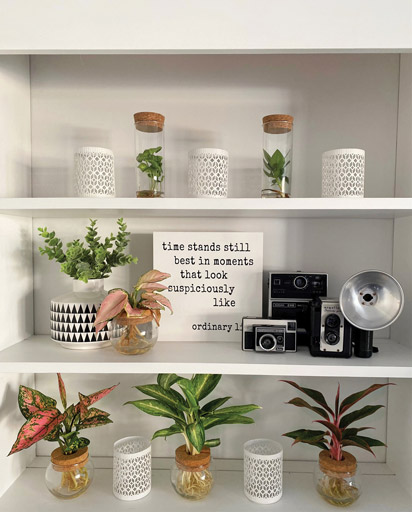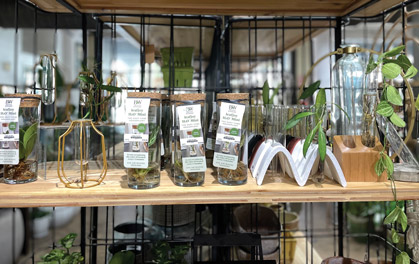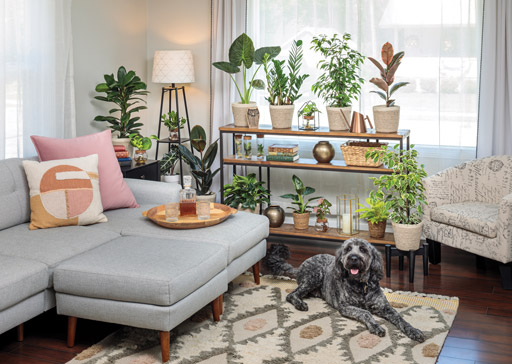
What’s Next in Houseplants
At its peak, 17.9% of the American workforce was working primarily from home — triple the pre-pandemic numbers — according to the American Community Survey released by the U.S. Census Bureau in September. And though many have returned to commuting, it’s clear that workers’ desire to continue to work from home remains strong.
“The pandemic revolutionized the workplace and expedited an already growing need for remote workers,” says Ragu Bhargava, CEO at Global Upside (Forbes.com). “The pandemic served as a massive wake-up call, teaching us not only that work was more than capable of being completed from home, but showing the need for flexibility for employees.” The boom our industry has experienced over the last few years has shown us that the more people work from home, the greater their desire to surround themselves with vibrant flowers and plants. That doesn’t mean only landscaping — it extends into their home offices, too.
IN-DEMAND VARIETIES
Enter houseplants. That old dust-laden, plastic ficus tree that’s been sitting in the corner of the room since 1990 has been replaced by living, breathing Cling-On Ficus benjamina or ficus ‘Fuzzy Wuzzy Audrey’. Perched at the edge of desks and bookshelves are smaller, tidier houseplants like tradescantia ‘Feeling Flirty’ and alocasia ‘Mythic Silver Dragon’. Plants in the aroid family, including monstera, philodendron, pothos, alocasia, colocasia and syngonium are especially hot in today’s market.
Flowering houseplants, including African violets, bromeliads and hoyas, are also making a comeback, according to Lisa Eldred Steinkopf, author of “Bloom: The Secrets of Growing Flowering Houseplants Year-Round” (Cool Springs Press, 2022). They pair well with popular variegated foliage plants such as philodendron ‘Prismacolor Pink Princess’ and rose-painted calathea, like ‘Color Full Rosy’ and ‘Color Full Dottie’, all of which make great home office companions.
Rare houseplants continue to be the holy grail for people who’ve become avid collectors, with some willing to pay hundreds or even thousands of dollars for the most prized specimens. Less money spent on transportation to and from work has left more disposable income for houseplants for the home office.
LEAFJOY COLLECTION MAKES ITS DEBUT
Now, houseplant grower The Plant Co. of Virginia, who has partnered with Proven Winners, is making unique houseplants more available to consumers. The leafjoy collection launched this year with over 100 varieties and is expected to grow in the coming years.
“Proven Winners’ leafjoy program was developed after surveying thousands of consumers through Facebook and Instagram,” says Dave Konsoer, Proven Winners’ vice president of sales. “We’re offering solutions that address many of consumers’ pain points, including confusion on where to place houseplants in their home and how to care for them once they’ve arrived.”
Combing through the results from more than 7,000 respondents polled in its recent survey, Proven Winners confirmed several notable preferences of today’s houseplant consumers, including:
• Consumers will spend an average of $50 per year on houseplants, with more than 60% of respondents indicating they’ve purchased houseplants as gifts for friends and family.
• Cream and white cache pots were the leading color preferences for those polled.
• 80% of survey takers reported that local garden centers are their primary go-to source when shopping for houseplants.
Consumers make houseplant purchases year-round, giving retailers an opportunity for consistent sales in this category. Sales are strongest from October through April, before people turn their focus to outdoor activities.
“Plant identification is also very important from our research. Consumers want to know what they’re buying,” Konsoer says. In response to that need, leafjoy houseplants’ labels have been designed to include accurate, variety-specific plant ID and care information. Each label includes recommendations for where in the home the plant will thrive. This information helps not only the consumer but also garden center staff who are assisting them and merchandising plants.
The leafjoy line is classified into four specific uses, each of which indicates the plants’ light and humidity preferences. The Atrium Collection includes high light plants for bright spaces, while the Cocoon Collection is just the opposite, preferring the lower light levels of interior rooms or those with smaller windows. The SpaScene Collection features plants for warm, humid spaces. Space-saving compact and vertical plants that don’t shed their leaves are reserved for desktops in the WorkLife collection.
The plant labels for each collection include color-coded icons that let a consumer see at a glance where the plant can be grown in their home. In many cases, a leafjoy plant can be used in multiple rooms, increasing the flexibility and opportunities for both consumers and retailers.
“Helping consumers be successful with their houseplants will not only lead to repeat purchases but also will help them develop a higher level of trust and confidence,” says Konsoer.
HYDROPONICS ARE HOT
“Young plant parents are especially keen on watching plants grow,” writes Steinkopf. “They like the feeling they get when they see their plant sprout a new leaf or watch a cutting make new roots in water.” There is something to be said for the sense of purpose one gets by nurturing something and seeing it thrive as a result.
The art of growing plants in water — hydroponics — provides a way to enjoy not only the leaf canopy but also see a plant develop in the clear glass vessel. It’s fulfilling to watch the roots grow and fill the space over time.
Hydroponic leafjoy H2O houseplants are a simple, innovative product that is nearly carefree, other than adding water periodically. They can be grown just about anywhere and make an excellent gift or impulse item at retail. A miniature bottle garden, called leafjoy H2O Mini, is a completely enclosed glass vessel that’s perfect for people with pets or those worried about spilling water near their laptop on their work desk. The leafjoy H2O Bowls allow people to grow houseplants without the mess or need for soil. Both products arrive to retailers pre-assembled with variety-specific labels that include care instructions attached.
PLANTS ARRIVE READY TO SELL
The Plant Co. is currently shipping retail-ready leafjoy potted and H2O houseplants directly to retailers across the U.S. These are well-grown, healthy, virus-indexed plants with a polished retail presentation. Three finished container sizes of the potted varieties are available with optional cache pots. Given that a majority of consumers tend to buy houseplants as gift items, cache pots are highly recommended. Low single-pallet minimums make these plants affordable and accessible to IGCs.
The leafjoy collection is divided into three retail product groups — Premium, Boutique and Collector’s Edition — to accommodate a range of price points. The Premium group contains plants grown to exacting standards and accounts for nearly 75% of the overall program. Boutique and Collector’s Edition varieties are available exclusively to IGCs and include rarer plants, many of which are currently trending, like philodendron ‘Prismacolor Pink Princess’.
Sidebar: Growing and Selling Houseplants
The Plant Co. (TPC), a houseplant grower, has partnered with Proven Winners to make unique houseplants more available to consumers. With the 2022 launch of the leafjoy collection, which includes over 100 varieties, I reached out to the team at TPC to find out what’s happening with houseplants.
GPN: What are common questions you get asked when discussing growing houseplants?
Laura Kline, director of growing: When speaking to people about growing indoor foliage, the questions we most encounter are similar between clients and growers. They want to know the correct light levels, proper moisture, required nutrients, and what type of pests or disease they should be on the lookout for.
GPN: What are some issues that come up often when growing houseplants?
Kline: The most common issue we encounter is improper light levels. Too high will cause leaf spotting, bleaching or burning of the leaves. Too low will result in yellowing of leaves and leaf drop. The leafjoy categories give the client a good start on where to locate the plants for successful growing.
GPN: How do you overcome these growing problems?
Kline: We are very watchful of our plants so that we can head off problems when they are small and easier to fix. Problems are easier to fix when you catch them early. We work with our partners to help solve any questions they have. Sometimes the solution is as simple as reducing the amount of irrigation or changing the amount of light being used. Commercial growers are given more technical guidance. We provide light level, moisture requirements, nutrient needs and pH/EC recommendations. We pride ourselves on providing healthy liners for the grower. Most of our plants come to us as tissue culture to ensure a disease-free, clean start. A quality liner is paramount in producing a quality finished plant.
GPN: What market trends are you currently seeing?
Ben Wright, territory sales manager: It is important to retailers that consumers succeed in their plant care adventures. A consumer who successfully becomes a new plant parent is likely to become a repeat customer. We looked at the existing houseplant marketplace and noticed that many plants were being sold without identification and plant care tags. We created a leafjoy variety-specific tag that includes a photo of each plant, variety name, where-to-use information and easy-to-understand care information.
GPN: Any other steps you are taking to be sure consumers will become repeat customers?
Wright: Our plants are grown with innovative practices that result in a disease-, insect- and weed-free houseplant. We are committed to growing leafjoy plants to a larger size and quality specifications than traditional houseplant growers. Leafjoy plants are leaf-shined prior to leaving the greenhouse, so they arrive retail ready. To expand the traditional consumer base, we created the leafjoy H20 line of easy-to-care-for houseplants. These hydroponic bottle gardens create strong impulse sales at retail from novice to experienced houseplant enthusiasts. They are virtually carefree, other than adding a little more water about once per month, making them the ideal gift item.
For an enhanced reading experience, view this article in our digital edition by clicking here.


 Video Library
Video Library 




















